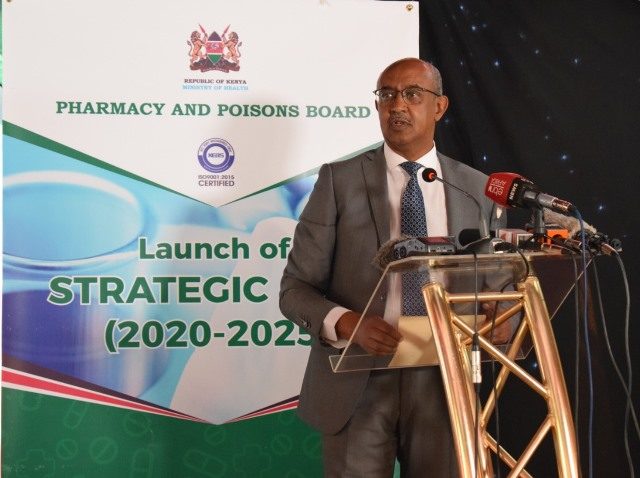
The Pharmacy and Poisons Board’s (PPB) has unveiled the Strategic Plan 2020-2025 geared towards promoting and protecting public health by ensuring medical products and technologies comply with standards.
The plan ushers in a new era for the PPB and positions the Board to be a leader in an interconnected and highly globalized industry that links pharmaceutical research, products, trade, personnel and services intricately.
Speaking on Monday at the PPB offices, the Health Ministry Chief Administrative Secretary (CAS), Dr. Rashid Aman, said the strategic plan will assist the Board curve a niche in delivering a wide spectrum of quality services within a robust governance and ethical framework besides assuring high standards of health for all Kenyans as enshrined in the Constitution.
Dr. Rashid said that post-market surveillance in medicine is key because it enables the detection of Sub-standard and Falsified (SF) medicine and establishes the effects of storage condition on quality and stability of the products.
Progress, therefore, he added involves and includes helping groups update pharmaceutical laws and policies to support Universal Health Care (UHC) and training staff to shore up necessary human resources.
“PPB has previously carried out post marketing surveillance monitoring of medicines, specifically on anti-malarials, ARVs, anti-TBs, antibiotics, reproductive health products among other group of medicines and this current Strategic Plan reaffirms the Board’s commitment to assuring the highest attainable standard of health for all Kenyans as a right,” he said.
Dr. Aman however, said that for effective implementation of the plan, the government will require to develop implementation plans and as a duty translate the plan into a tool of service to enable stakeholders become champions of medicine safety.
The CAS noted that it was both an individual and collective duty and responsibility as citizens, partners, leaders, public servants and as governments to recommit to accelerated action towards the shared sector vision of Universal Health Coverage (UHC).
Dr. Kioko Jackson, the Chairman PPB said medicine regulation has become more critical with the liberalization and globalization of trade in pharmaceuticals with Falsified Substandard Medicines posing a global health crisis.
He reiterated that the PPB has stepped up its commitment to fight the dangers posed by substandard, falsely labelled and falsified medical products through an elaborate drug registration system established that ensures only safe, quality and efficacious products are registered.
“Seventy percent of the medicines used in the country are imported with the remaining amount being produced locally and the imported products, including donations must also get an import permit from PPB for them to get into the country”, he noted.
Dr. Kioko further noted that there are designated ports of entry manned by PPB staff where one is allowed to either import or export medicines through and the premises where these medicines are being sold are also regulated by the Board and all of them must at all times be under the management control of PPB registered and approved personnel.
On Post market surveillance, Dr. Kioko said that the Board has remained vigilant for the products in the country to ensure again that they are safe, efficacious and of good quality.
“We do randomly collect samples from all over the country and effective analysis done at the National Quality Control Laboratory, a WHO prequalified laboratory. A system of reporting suspected poor quality medicines and suspected adverse drug reactions has also been established and this helps the Board monitor the medicines in the country,” he said.
He assured consumers that the safest pharmacies are accredited by PPB and the most trusted and respected means for the public to distinguish between legitimate and illegitimate drug sellers is to use the health safety code which is displayed in all registered pharmacies.
Dr. Kioko thanked the public for their patience and support, saying that the Board will rely on a participatory and inclusive approach to ensure that stakeholders, including manufacturers, universities, research organizations, traders, pharmacy practitioners and other healthcare professionals are proactively engaged and involved
The PPB Chief Executive Officer (CEO), Dr. Fred Siyoi said the Strategic Plan that took a record seven months to complete is costly and will require Sh. 12.5 billion for implementation in the next five years .
“We do not have the resources and we have to generate money to support the Strategic Plan and thus we are requesting to be raising Sh. 2.3 billion per year with the help of partners and stakeholders,” Dr. Siyoi said.
The PPB is mandated to regulate through registration and licensing of pharmacies and pharmacy practitioners, ensure quality safety and efficacy of all medicinal substances and also be in charge of import and export of all medicinal substances.
By Wangari Ndirangu





